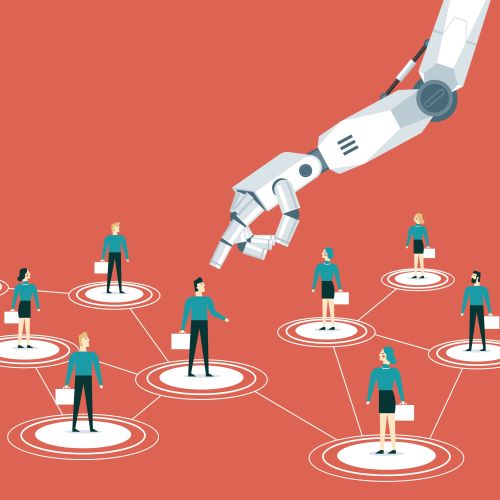21 May 2025
 Artificial intelligence (AI) is increasingly being used in human resources (HR) to streamline processes and enhance decision-making by helping employers efficiently sift through large volumes of job applications.
Artificial intelligence (AI) is increasingly being used in human resources (HR) to streamline processes and enhance decision-making by helping employers efficiently sift through large volumes of job applications.
However, relying on AI tools alone to screen candidates isn’t enough to improve diversity outcomes in workplaces, according to new research by the University of South Australia.
Human resource management expert Associate Professor Connie Zheng, co-director of UniSA’s Centre for Workplace Excellence, has conducted research into how AI can affect hiring decisions when it comes to improving diversity and inclusion by reaching gender quotas, having racially diverse teams and recruiting LGBTIQA+ employees or people with disabilities.
AI tools are being used by some HR professionals to assist in the recruitment process by screening job candidates, responding to applicant emails, or focusing on specialised tasks such as CV screening, job matching or voice and video analysis.
Assoc Prof Zheng says two separate studies into the use of AI to enhance diversity and inclusion in hiring decisions looked beyond whether humans or AI make better choices.
“We explored what conditions help AI tools to actually support more diverse hiring as we found that simply having a reliable AI tool isn’t enough to improve diversity in workplace recruitment,” she says.
“Diversity only improves when the AI system can explain its decisions in terms of diversity, when hiring focuses on qualitative goals and not just numbers, and when an organisation has clear diversity guidelines.
“These factors encourage HR professionals and decision-makers to reflect more carefully on their choices. In short, AI can help improve diversity in hiring, but only when used under the right conditions and organisational support for the application of new technology, as well as clear diversity, equity and inclusion guidelines.”
Despite the growing popularity of AI in many fields including education, health care, manufacturing and finance, many HR professionals are hesitant to adopt the tools.
Assoc Prof Zheng says some companies have several concerns and are reluctant to invest in AI for hiring decisions because they’re apprehensive about the limitations of the technology, particularly in terms of biased data.
She says many also feel their existing HR teams are competent enough to manage recruitment without AI, despite these concerns shifting if HR departments face staffing reductions, increased workloads or heightened demands for efficiency.
“Despite these reservations, many organisations view AI as a way to significantly save costs by streamlining manual processes. Some companies have the mindset that using AI in HR is efficiency driven – it will make them work faster. The main goal of using AI is to expedite the process, particularly when dealing with large volumes of job applications,” Assoc Prof Zheng says.
“With AI, a hirer can use the technology to filter appropriate applicants rather than sifting through hundreds of CVs and job applications manually. The problem when the main goal is efficiency is that diversity issues often then take a backseat.”
Whether the use of AI tools in recruiting helps reduce discrimination or instead intensifies the problem remains a subject of controversial debate. Assoc Prof Zheng’s ongoing collaborative research with HUMAINE – Human Centred AI Network led by Professor Uta Wilkens at Ruhr University Bochum, Germany – has revealed that simply providing a reliable, AI support tool that is considerate of diversity needs doesn’t automatically lead to diversity enhancement.
“Unless the organisation and its hirers are conscious about diversity and justice issues, using AI for talent acquisition isn’t going to lead to more diverse and inclusive outcomes,” Assoc Prof Zheng says.
To access the research papers:
- Wilkens, U., Lutzeyer, I., Zheng, C., Beser, A., & Prilla, M. (2025). Augmenting diversity in hiring decisions with artificial intelligence tools. The International Journal of Human Resource Management, 1–38. https://doi.org/10.1080/09585192.2025.2492867
- Zheng, C., Wilkens, U. (2025). Antecedents of Enhancing Diversity and Inclusion with AI Tools—An HR Perspective. In: Moussa, M., McMurray, A. (eds) The Palgrave Handbook of Breakthrough Technologies in Contemporary Organisations. Palgrave Macmillan, Singapore. https://doi.org/10.1007/978-981-96-2516-1_12
…………………………………………………………………………………………………………………………
Contact for interview: Connie Zheng, Associate Professor in Human Resource Management, Co-Director, Centre for Workplace Excellence, UniSA, E: Connie.Zheng@unisa.edu.au
Media contact: Melissa Keogh, Communications Officer, UniSA M: +61 403 659 154 E: melissa.keogh@unisa.edu.au




